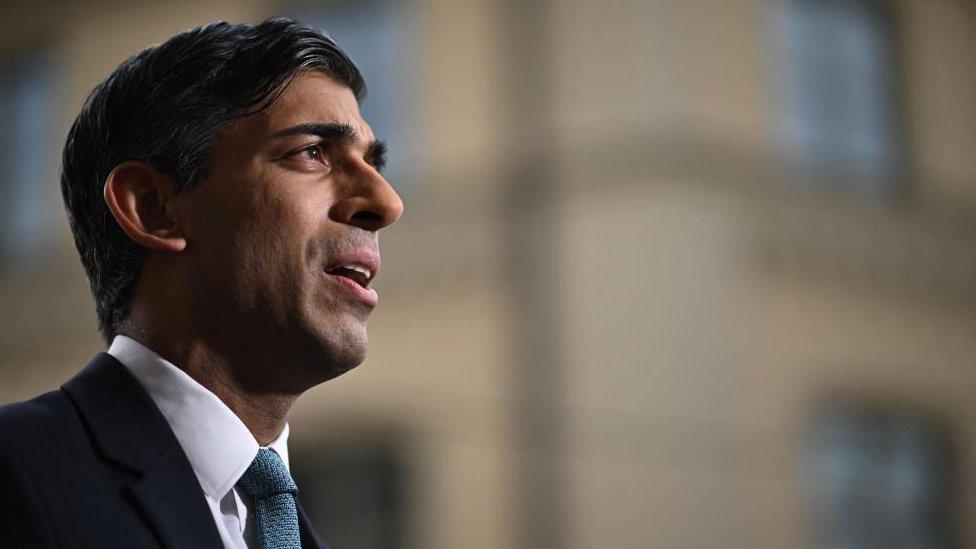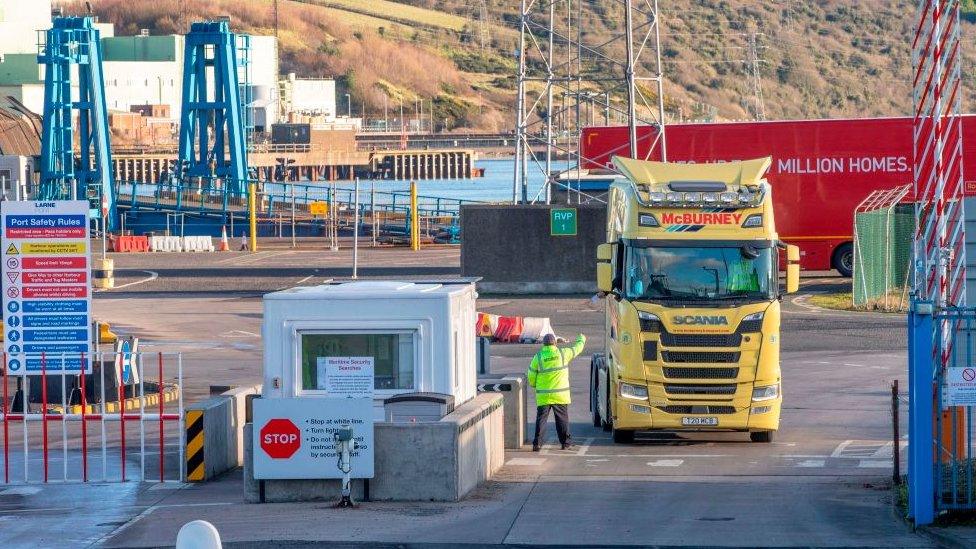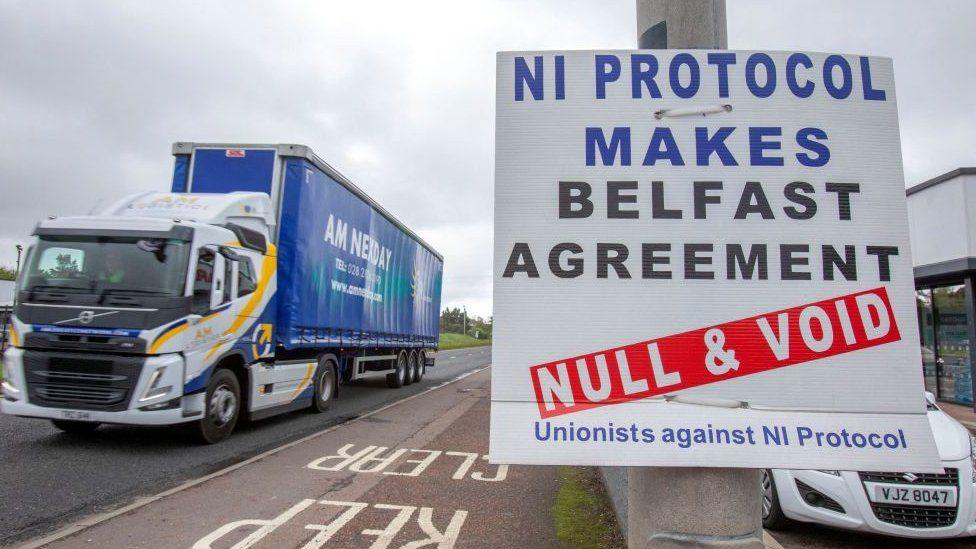Northern Ireland Protocol: Sunak 'giving it everything' to reach Brexit deal
- Published

Rishi Sunak says he is "giving it everything" this weekend to secure a new Brexit deal for Northern Ireland, and he wants "to get the job done".
But the prime minister said no agreement had yet been made between the UK and the European Union.
Deputy PM Dominic Raab told the BBC the UK was close to a deal.
He said: "If we can get this over the line - we're on the cusp, we've made great progress, we're not there yet - this would be a really important deal."
Irish Prime Minister Leo Varadkar said the deal over trade between Great Britain and Northern Ireland was "inching towards a conclusion".
A No 10 source has described the negotiations as positive.
The taoiseach urged politicians from the UK, Brussels and Northern Ireland to "go the extra mile" to get it over the line.
The Northern Ireland Protocol was agreed under former PM Boris Johnson after the UK left the European Union.
It sees Northern Ireland continue to follow some EU laws so that goods can flow freely over the border to the Republic of Ireland without checks.
Instead, goods arriving from England, Scotland and Wales are checked when they arrive at Northern Irish ports.
Critics, including Northern Ireland's Democratic Unionist Party (DUP), feel this undermines the nation's position within the rest of the UK as well as impacting trade.
The DUP, which also wants less EU oversight of the rules, is blocking the formation of devolved government in Northern Ireland because of its concerns.
Leo Varadkar encourages the UK and EU to reach an agreement
The UK and EU have been negotiating on a way forward and appear to be on the brink of completing a new deal - for which the prime minister has been trying to win support.
Speaking to the Sunday Times, external from Downing Street, Mr Sunak said: "I'm here all weekend trying to get it done... We're giving it everything we've got."
He said he wanted to show that Brexit "works for every part of the United Kingdom", continuing: "There's unfinished business on Brexit and I want to get the job done."
The prime minister said "the idea that the EU can impose laws on Northern Ireland without them having any say isn't acceptable", adding that ensuring stability for the people of Northern Ireland is key.
"It's about the people and communities of Northern Ireland," he told the newspaper. "It's about what's best for them and that's what everyone should have in the uppermost of their minds."
He added in an article for the Sunday Telegraph, external: "Resolving this issue is fundamental to everything that I believe as a Conservative, as a Brexiteer and as a Unionist."
Dominic Raab told BBC Sunday with Laura Kuenssberg the government had "made progress" in negotiations over the Northern Ireland Protocol but a deal was "not there yet".
He said the UK wants to see a shift away from checks on every consignment of goods coming into Northern Ireland from the rest of Britain.
Instead, the EU should be encouraged to rely on an intelligence based-approach.
"Encouraging the EU to look at market surveillance - which means where they're worried about goods arriving in Northern Ireland then going to the rest of the EU, including Ireland, and posing a threat to the single market they monitor that through the shops in the Republic and rest of the EU," he told Sky News.
He also suggested if there are any new trade rules affecting Northern Ireland then there must be a Northern Irish "democratic check" on that.
Asked if MPs would get to vote on any new deal, Mr Raab said: "Parliament will have its ability to express itself."
Meanwhile, there had been plans for King Charles to meet the president of the European Commission in the UK on Saturday, the BBC understands.
The planned meeting between the King and Ursula von der Leyen, originally reported by Sky News, was not part of the negotiations between the UK and the EU and multiple sources said her visit was cancelled due to operational reasons.
A source from the DUP told the BBC they had no meetings scheduled over the weekend over the protocol.
DUP leader Sir Jeffrey Donaldson has previously said that the objective for London and Brussels should be to "get this right rather than rushed".
The prime minister has been facing added pressure from some Conservative MPs over Northern Ireland's current obligation to follow some EU laws and be accountable to the European Court of Justice.
Mark Francois, who heads the European Research Group of Eurosceptic Tory MPs, warned Mr Sunak it would be "incredibly unwise" to bring in any new deal without giving MPs a vote.
He told Sky News: "Don't try to bounce Parliament next week because that is likely to go badly wrong.
"So, if they've got a deal they're proud of, show us the text. Let us run it by our lawyers. Let us fully understand what it means. Then, at that point, we might be ready to vote on it."
He added that EU law needed to be "expunged" from Northern Ireland bringing it in line with England, Scotland and Wales.
Speaking on Laura Kuenssberg on Sunday, Labour's shadow foreign secretary David Lammy said his party would vote for a new deal in the national interest of the UK and restoring Northern Ireland's Assembly.
"Our judgement is that any deal that emerges will be better than what we've got now," he said.

What is the Northern Ireland Protocol?
The Northern Ireland Protocol is a trading arrangement, negotiated during Brexit talks. It allows goods to be transported across the Irish land border without the need for checks.
Before Brexit, it was easy to transport goods across this border because both sides followed the same EU rules. After the UK left, special trading arrangements were needed because Northern Ireland has a land border with the Republic of Ireland, which is part of the EU.
The EU has strict food rules and requires border checks when certain goods - such as milk and eggs - arrive from non-EU countries.
The land border is a sensitive issue because of Northern Ireland's troubled political history. It was feared that cameras or border posts - as part of these checks - could lead to instability.
The UK and the EU agreed that protecting the Northern Ireland peace deal - the Good Friday agreement - was an absolute priority.
So, both sides signed the Northern Ireland Protocol as part of the Brexit withdrawal agreement.
It is now part of international law.



Related topics
- Published25 February 2023

- Published8 February 2023

- Published24 February 2023